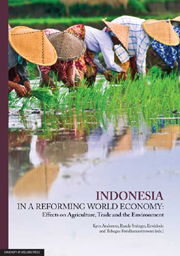Book contents
- Frontmatter
- Contents
- List of tables, figures and boxes
- FIGURES
- Acronyms
- Preface
- List of contributors
- 1 Introduction
- 2 Effects of growth, its interruption, and the Uruguay Round on Indonesian agriculture
- 3 Effects of AFTA and APEC trade policy reforms on Indonesian agriculture
- 4 Trade liberalisation and soil degradation in Indonesia
- 5 Will the Uruguay Round and APEC reforms harm air and water quality in Indonesia?
- 6 Impacts of agricultural protection growth at home and the WTO's Doha Round on Indonesian agriculture
- 7 Effects of agricultural policy reform on household and regional income distribution in Indonesia
- 8 Effects of farm policy reform on Indonesia's secondary food crops
- 9 Effects of agricultural policy reform in Indonesia on its food security and environment
- 10 Impacts of trade policy reform on income distribution and poverty in Indonesia
- APPENDIX 1 The WAYANG Model of the Indonesian economy
- APPENDIX 2 The GTAP Model and database
1 - Introduction
Published online by Cambridge University Press: 05 June 2012
- Frontmatter
- Contents
- List of tables, figures and boxes
- FIGURES
- Acronyms
- Preface
- List of contributors
- 1 Introduction
- 2 Effects of growth, its interruption, and the Uruguay Round on Indonesian agriculture
- 3 Effects of AFTA and APEC trade policy reforms on Indonesian agriculture
- 4 Trade liberalisation and soil degradation in Indonesia
- 5 Will the Uruguay Round and APEC reforms harm air and water quality in Indonesia?
- 6 Impacts of agricultural protection growth at home and the WTO's Doha Round on Indonesian agriculture
- 7 Effects of agricultural policy reform on household and regional income distribution in Indonesia
- 8 Effects of farm policy reform on Indonesia's secondary food crops
- 9 Effects of agricultural policy reform in Indonesia on its food security and environment
- 10 Impacts of trade policy reform on income distribution and poverty in Indonesia
- APPENDIX 1 The WAYANG Model of the Indonesian economy
- APPENDIX 2 The GTAP Model and database
Summary
For the quarter-century prior to the financial crisis of late 1997, Indonesia's economic performance had been, along with that of other East Asian countries, one of the best in the world. During those years Indonesia's real GDP grew at an average rate of more than 6 percent per year, inflation averaged less than 10 percent, and the incidence of poverty fell from three-fifths to one-seventh of the population. Significant structural changes accompanied that rapid economic growth, the nature of which raised important questions about its impact, together with that of Indonesia's agricultural, industrial, trade and environmental policies, on the sustainability of the country's development.
Up to 1997 all the forward-looking analyses aimed at understanding how to best address these structural changes had assumed the economy would continue growing at a strong pace into the future. The dramatic withdrawal of financial capital from Indonesia and the crash in the value of its currency from late 1997 meant that all these previous analyses needed to be revised. Also, the domestic policy emphasis shifted temporarily to emphasise basic concerns over unemployment, hunger and poverty, leaving concerns over the environment to richer countries' citizens.
Lots of important new questions emerged. How much difference would a few years of GDP decline in Indonesia make to projections of the structure of production, employment and trade? Might there be a re-agriculturalisation of the economy? How would the crisis alter the expected effects on Indonesia of implementation of the WTO's Uruguay Round agreements, and hence on attitudes towards the efficacy of trade and other economic policy reforms?
- Type
- Chapter
- Information
- Indonesia in a Reforming World EconomyEffects on Agriculture, Trade and the Environment, pp. 1 - 9Publisher: The University of Adelaide PressPrint publication year: 2009



